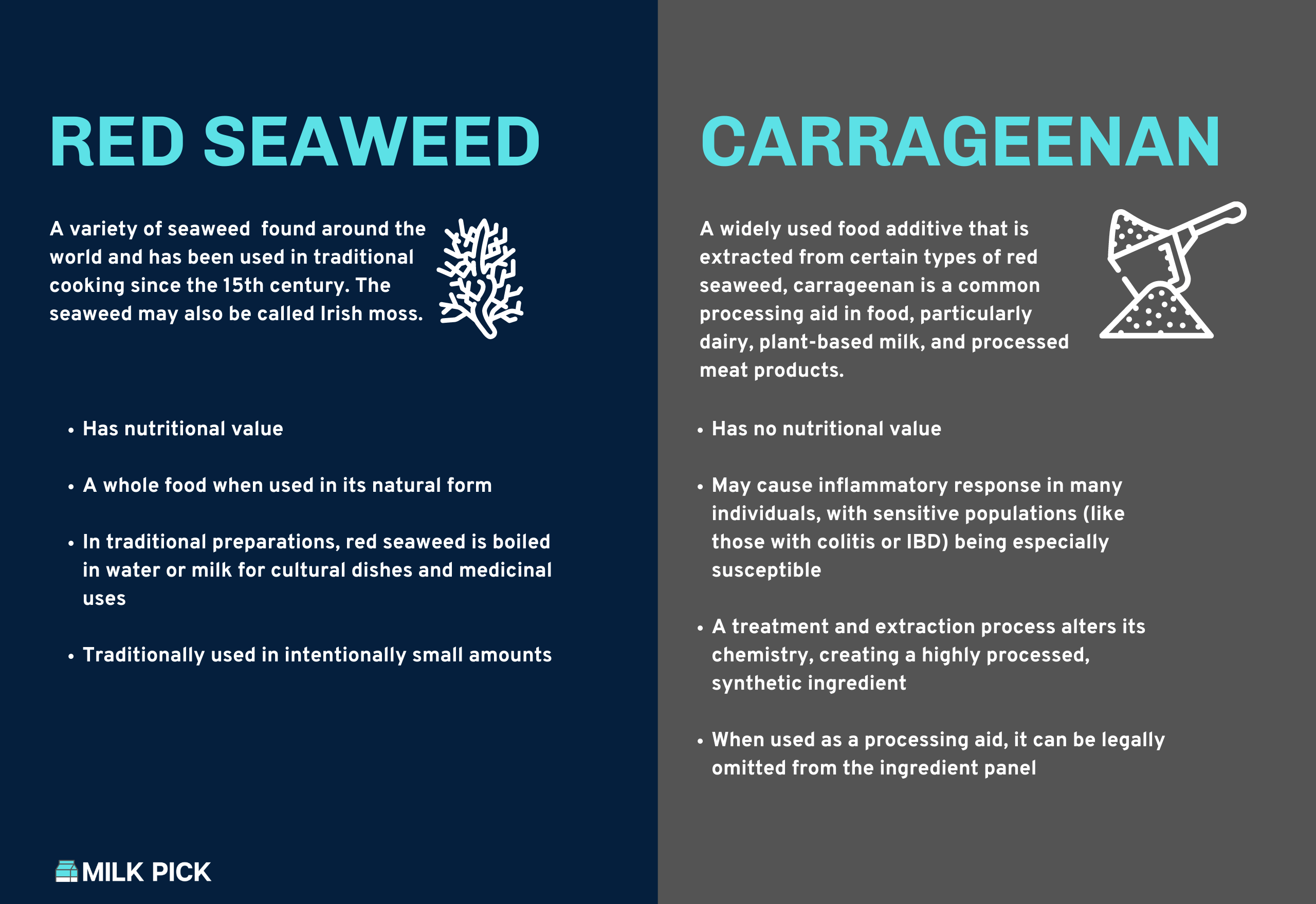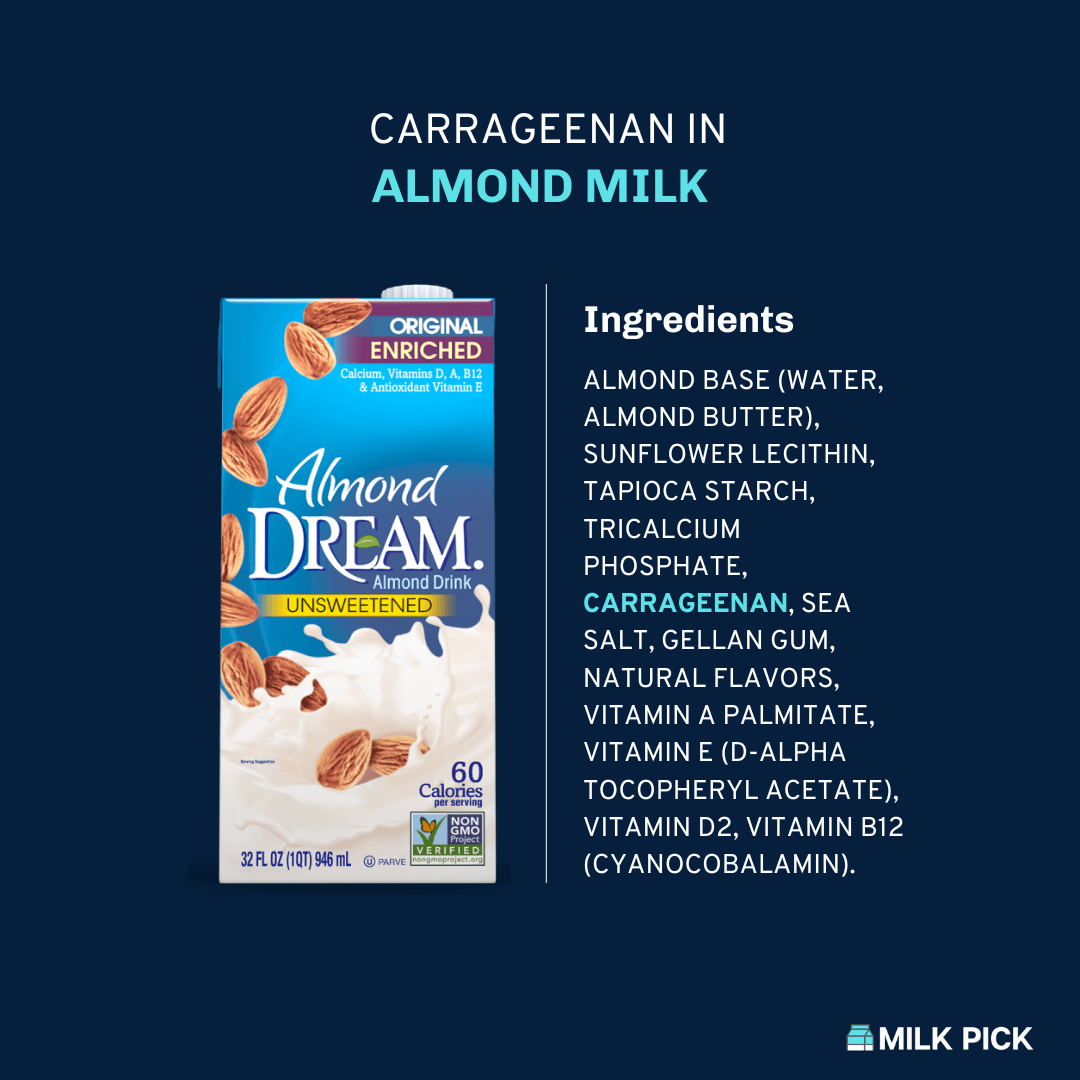If you see carrageenan on a food label, you may just write it off as a hard-to-pronounce word that’s harmless. Unfortunately, this couldn’t be further from the truth.
Carrageenan is an additive derived from red seaweed that’s used in almond milk to help thicken and bind ingredients together. Carrageenan has been linked to increased inflammation in your gut, increased risk for colon cancer, and can impair your body’s insulin response.
This article will help you better understand exactly what carrageenan is, and why it doesn’t belong in your almond milk.
What is Carrageenan?
Carrageenan is what is called an additive. Additives are substances that are added to a food or beverage item to either help improve or preserve the product.
Carrageenan itself is a gum that’s created using a variety of red seaweeds.
The red seaweed is usually processed in one of two ways resulting in a final product of either degraded or undegraded carrageenan.
Degraded carrageenan is processed with acid and, per the FDA, is not allowed in food as it has been found to be dangerously inflammatory in nature.
It’s so inflammatory that researchers will use it to induce inflammation in animals during experiments.
Undegraded carrageenan is not processed with acid and has been approved by the FDA to be used in food and beverages.
However, our food and beverages go through our stomach, which is an acidic environment.
This is, in part, what triggered scientists to further explore the effects of undegraded carrageenan, as it may become degraded as it gets digested, resulting in potential health concerns.

Why is Carrageenan Used in Almond Milk?
You might be thinking to yourself, “Why do they need to add carrageenan to a product to begin with?”
When it comes to almond milk, carrageenan is primarily there to improve the texture of the drink to make it more enjoyable.
Almond milk on its own can sometimes lack the thickness that cow’s milk offers, making it less appealing to consumers.
Adding carrageenan creates a thickness that mimics the creamy texture of the milk consumers may be more accustomed to drinking.
Carrageenan also serves to make sure the ingredients in the almond milk do not separate to keep it a stable beverage.
This allows products to stay shelf stable in the grocery store for longer durations.
What Does the FDA Say About Carrageenan?
As we previously mentioned, the FDA does approve the use of undegraded carrageenan in food and beverages.
However, a few specific requirements are listed by the FDA that producers must follow if they add carrageenan to their products.
The FDA requires that the carrageenan has to be obtained from one of the specific species of red seaweed listed on their site.
It’s also only allowed to contain 20 to 40 percent sulfate and has to be composed of two main types of sugar molecules.
The FDA restricts carrageenan to being used for thickening, stabilizing, or emulsifying a food or beverage item.
And if it is used in a product, it must be directly listed on the ingredient list of the product.
However, there are no designated restrictions regarding the quantity of carrageenan that can be used in a product.
Also, producers are not required to distinguish which type of red seaweed they used to make the carrageenan.
Carrageenan and Gut Health
At first glance, carrageenan may not sound like a bad ingredient, given that it’s derived from a natural source of red seaweed.
Despite its natural source, research finds that carrageenan is far from harmless for your gut health.
Research has linked carrageenan to increased inflammation in the intestines, which could further aggravate conditions like Irritable Bowel Syndrome (IBS) or ulcers.
Other studies also determined that consistent consumption of carrageenan seems to disrupt the gut microbiome.
They theorize this disruption is what causes increased levels of inflammation in your gut.
These studies were generally performed by looking at the effect of carrageenan on the gut within a short time frame.
Little is known about the effect of long-term consumption of carrageenan on your gut health.
Based on what we do know about the short-term effects, it may not be wise to consistently consume products containing carrageenan if you tend to experience issues with digestion or your gut in general.
Carrageenan and Diabetes
In addition to having a negative impact on your gut health, new research is finding that carrageenan might be harmful to individuals with diabetes.
Before we discuss carrageenan’s effects on diabetes, let’s make sure we have a clear understanding of diabetes.
Type 2 diabetes, which is the most common form, occurs when your body does not respond to insulin.
Insulin’s job is to let the sugar from your blood into your cell. Consequently, your blood sugar can get too high if insulin is not working correctly, resulting in diabetes.
Research shows that consuming carrageenan may inhibit insulin sensitivity making it harder for individuals with diabetes to manage their blood sugar.
It’s important to manage your blood sugar levels if you have diabetes, as levels that are too high can cause a wide range of serious health problems.
Related: Is Almond Milk Good for Diabetics?
Carrageenan and Colon Cancer
Now we know that carrageenan can be harmful to individuals with gut issues and diabetes, but research is finding that it may even promote the development of certain types of cancer.
Research examining the effects of consuming undegraded carrageenan in animals found that those animals were more likely to develop colon cancer than animals that did not consume the carrageenan.
While these studies were performed using animals and more studies regarding the topic are warranted, it should still make you pause when it comes to consuming carrageenan.
If you want to make dietary choices that reduce your risk of developing cancer, you may want to think twice before consuming plant-based milk containing carrageenan.
How Do You Know If Your Almond Milk has Carrageenan?
After learning about carrageenan, you might want to know how you can spot it in your almond milk.
It’s easy to find as all you have to do is look at the ingredients list on your container of almond milk. It will be listed directly as carrageenan.
It is important to remember that ingredients are listed in order from the highest amount to the least amount in that product.
This means that if carrageenan is listed towards the start of the list, it is more prevalent in that product.
Luckily, most commercial plant-based milk no longer uses carrageenan, so it’s by no means impossible to find almond milk without it at the grocery store.
One of the only brands we were able to find that still uses carrageenan is Almond Dream. So you may want to steer clear of that particular almond milk.

You can also avoid it altogether and know exactly what’s going into your almond milk by making your own at home with just a few simple ingredients.
Carrageenan Doesn’t Belong in Milk
Carrageenan is an additive created using red seaweed that is used in products like almond milk to thicken and stabilize the product.
Unfortunately, there are a variety of potential negative health effects that stem from consuming this additive.
The FDA has approved the use of undegraded carrageenan and requires that it be listed on the product on the ingredient list.
Research has found that carrageenan is correlated with increased intestinal inflammation, which can cause more symptoms in people who has conditions like IBS and ulcers.
It’s also been linked to an increased risk of colon cancer in animal studies.
Another studied side effect of carrageenan is reduced sensitivity to insulin which can increase your blood sugar levels and be harmful to individuals with diabetes.
Since the research on long-term effects of carrageenan is limited, you may want to play it safe and consume almond milk that doesn’t have it.
You can prioritize your health by either making your own almond milk at home or by making sure you check the ingredient list on your almond milk.
